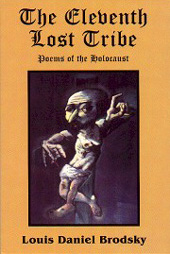

The Eleventh Lost Tribe
Poems of the Holocaust
Hardback and Paperback: 105 pp.
Published: 1998
Price: $18.95, $12.95
BUY THE BOOK from Amazon.com
The Eleventh Lost Tribe, Brodsky’s fourth book of poems devoted to the Holocaust, asks the reader to confront the dispossessed lives of ghetto dwellers, death-camp survivors, Jews prescient or desperate enough to have fled Europe prior to being captured and slaughtered, and, finally, children of the Shoah’s refugees or orphans of those who perished in it.
Exposing the gritty existence of characters Brodsky has resurrected from his imagination, the book’s four sections implore the reader to follow on a quest not so much for historical fact as emotional truth, in search of a better understanding of our incredulity and outrage over the Holocaust.
Although no sane design can be applied to the irrationality of the German wartime psyche, Brodsky has given order to the narrative formed by these characters, grouping them by their proximity to the actual smells and sounds, obscenity and corruption of death. While no one can know the depths of horror experienced by those who were about to inhale the gas or be incinerated in the ovens or shot at point-blank range, Brodsky suggests that those who survived carry just as devastating and palpable an insight into death for having to live with their memories.
This book brings those memories to life through the eyes of camp survivors, refugees, and their children, revealing scars so deep that nothing can alleviate their debilitating pain, ultimately rendering these victims the waking, walking dead, the wandering ghosts from another lost tribe — the fated eleventh — comprising these misbegotten spirits, those who died, and all of us now assimilated into the aftermath of the Holocaust.
Praise:
It’s as though the Holocaust still lives within him, within these angry, defiant poems, not as a subject to write about, but bone of his bone, nerve of his nerve.
— Rodger Kamenetz, author of The Missing Jew
The Eleventh Lost Tribe is one of those collections that can touch the heart and, at the same time, serve as an inspiration to have faith in human potential.
— Rabbi Robert Sternberg, former director of the Holocaust Museum and Learning Center, St. Louis
The Eleventh Lost Tribe is a thoughtful meditation on the post-Auschwitz human condition. The collection sensitively explores the limits of language and the enormity of loss for the generations who come after the Holocaust. The Shoah is history, but as Louis Daniel Brodsky’s gifted poetry shows, the event continues to live in the lives of succeeding generations.
— Alan L. Berger, Raddock Family Eminent Scholar in Holocaust Studies and Director of the Center for the Studies of Values and Violence after Auschwitz, Florida Atlantic University
BUY THE BOOK from Amazon.com
According to Plan
The objective, unquestionably,
Will be for them to try,
With their feeble intellection,
To beat Satan and his crew,
Shape a lasting peace out of compassion,
Repudiate and relegate to forgetting's far reaches
Ignorance and bigotry and hatred and cruelty and violence,
Which, otherwise, will shame their potential humanity,
Deny them, in My eyes,
A restored record of love, kindness, and decency,
A heritage commensurate with My intended mercy,
So that women and men,
All the generations of Adam and Eve,
Might venerate My ideal state,
Where war is, at worst, a dead issue,
A mute eunuch's desperate, stillborn outrage,
An undiscoverable source of dementia,
Dementia a schizophrenic coefficient of genocide,
A godless atrocity,
And genocide a dimensionless nonentity outside space and time.
If my latest creations, these new humans,
Will only remember that, being indefensibly dispensable,
They must never resort to Final Solutions,
Rather need to leave the business of immortality to Me
And just trust in My omniscience,
Everything will go, as usual, according to plan.
To read my interview with Charles Adès Fishman, about my writing on the Holocaust, please click here.